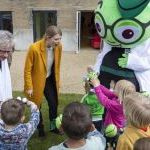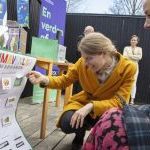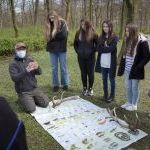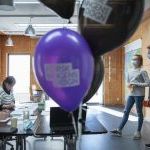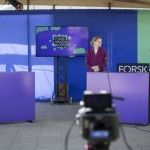The Danish Science Festival
The Danish Science Festival is a nationwide, week-long event that connects researchers with the public, organised by The Ministry of Higher Education and Science. Every year a week is dedicated for scientists to share their knowledge through all types of events such as talks, lectures, “Science cafés”, “Science city squares”, hands-on experiments, tours, debates, science shows, theatre and much more. Around 300 scientists make themselves available during the week. As part of this event, teaching material is developed for kindergarten and school level, each year focusing on a different theme. The school theme of 2021 was ‘Climate on the menu’, focusing on sustainable food consumption.
Website
Useful links
Country
Media
Photo credit: Søren Kjeldgaard
Useful UK Links
The British Science Week has a different theme each year, and includes a range of resources and activities for schools to get involved with.
* TOP TIP *
'Look at food consumption as part of your science lessons to see how our buying habits impact the climate'
How is the project linked to climate change and sustainability?
The theme “Climate on the menu” focus on topics such as food production, consumption, food waste and waste management and is developed in close collaboration with researchers in the respective fields. It helps raise awareness about how our buying habits and actions can have an effect on climate change.
Who is involved?
The school (teachers and pupils), researchers, local stakeholders and a Danish Science Festival secretariat (that coordinates and promotes the project).
How are the participants involved?
As part of the Danish Science Festival week, school classes took part in a competition. Within the overall project themes, groups of pupils chose a specific problem to examine in depth and develop a potential solution. They did interviews with relevant local people, such as supermarket managers or consumers, and then presented their results in front of a table of judges (consisting of researchers and local stakeholders, representing the municipality, a private company or an educational institution). The event thereby connected research, pupils and local stakeholders through shared engagement in climate friendly food solutions. The event was public and communicated in local and national media, thus spreading the idea. The teaching materials can also be used on an ongoing basis to help schools communicate the issues.
Key steps:
One of the main inspirations to take from the event is to connect research, pupils and local stakeholders through engagement in climate friendly food solutions. This can be achieved in many ways, but some key steps are to:
1. Identify relevant research questions that can be examined by pupils as part of a school project – this can be done in collaboration with a researcher or based on teaching material.
2. Contact local stakeholders who might be interested in collaborating with pupils on their projects.
3. Invite local stakeholders and relevant researchers to provide feedback to students’ results.

